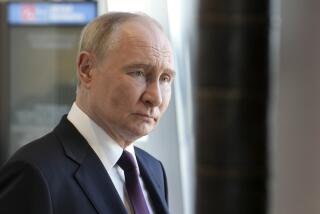Yeltsin Reads Top Bankers the Riot Act
- Share via
MOSCOW — Russian President Boris N. Yeltsin moved to reclaim control over his country’s economy Wednesday when he put a small group of powerful bankers on notice that it will no longer decide frontier capitalism’s rules of play.
The president’s announcement, in a speech to the upper house of the legislature, was the latest salvo in a war that has been waged for months between Yeltsin’s key architects of market reform and the “Big Seven” financiers who are thought to control as much as half of Russia’s economy. Their funding helped the president get reelected last year.
The seven have enjoyed insider access to major privatization deals over much of the past two years but have lately bridled at government efforts to make the process more competitive. Yeltsin warned Wednesday that future sell-offs of state assets will be through competitive tenders and that “the state will not tolerate any attempts to put pressure on it by the representatives of business and banks.
“The government is setting clear and equal rules of economic behavior,” Yeltsin said. “We shall make everybody unconditionally abide by those rules--big business, medium business and small business, as well as the state itself.”
Since the appointment last spring of market advocates Anatoly B. Chubais and Boris Y. Nemtsov as first deputy prime ministers, sales of shares in attractive government industries have been going to the highest bidder in confidential tenders rather than being parceled out among the business clique at knockdown prices.
While it was his strongest statement yet in the public squabbling over the spoils of privatization, Yeltsin’s latest upbraiding of the powerful industrialists also called further attention to an embarrassing and disruptive division in the ranks of power.
Yeltsin’s address may have been also intended as a message to the regional leaders who make up the upper house, the Federation Council, that they should refrain from interfering with investment projects negotiated between the federal government and foreign partners. Several important deals, including a major oil contract with Exxon, have recently been torpedoed by provincial leaders looking to attach local taxes and other prohibitive conditions.
“This is having a very negative influence on the image of the leadership,” said Andrei Piontkowsky, director of Moscow’s independent Center for Strategic Studies. “The government is being discredited, and the opposition doesn’t even have to get involved. Their work is being done for them by members of the government who are attacking each other.”
Yeltsin said it is time for the leadership to adjust its role “away from the policy of noninterference to the preemptive regulation of economic processes.” He insisted that there will be no return to Soviet-era state management.
“The leitmotif of the Russian president’s speech at the Federation Council is that neither the banks nor their capital will ever issue commands to the state or the people,” Nemtsov, who also serves as fuel and energy minister, told reporters after Yeltsin’s address.
Yeltsin last week called six of the seven industrialists to the Kremlin for a dressing down over their increasingly vitriolic squabbling through the mass media they control.
The most public battles have been over a 25% share offering in Svyazinvest, a communications conglomerate that owns most Russian telephone and broadcast channels, and the debt-ridden Norilsk Nickel enterprise in the far north.
Bids for both were won by the financial consortium headed by Vladimir O. Potanin of Uneximbank, which enraged rival tycoons Vladimir Gusinsky and Boris A. Berezovsky, who have accused the new leadership of favoring Potanin because he is closely allied with Chubais.
Chubais and Nemtsov have defended themselves by noting that Potanin’s consortium was the highest bidder--a detail brushed aside in the diatribes printed in newspapers and aired on television networks controlled by the losers.
Berezovsky was the one member of the original Big Seven conspicuously absent from last week’s meeting with Yeltsin. He is deputy Security Council chief, and as such has purportedly placed his shares in a trust.
But Berezovsky and Gusinsky reportedly have been lobbying Prime Minister Viktor S. Chernomyrdin for resumption of the old methods of auctioning off shares, in which the favored bidders set the terms for the sell-offs.
The industrialists’ attempts to play off two factions within the government against each other--Chubais and Nemtsov against their ostensible boss, Chernomyrdin--can only hurt the Russian economy in the long run by scaring off impartial investors, Piontkowsky warned.
More to Read
Sign up for Essential California
The most important California stories and recommendations in your inbox every morning.
You may occasionally receive promotional content from the Los Angeles Times.











